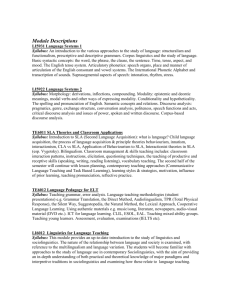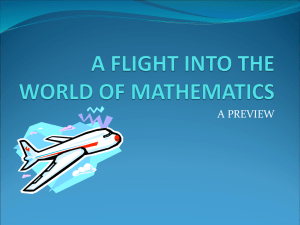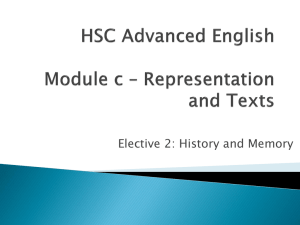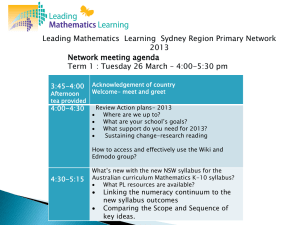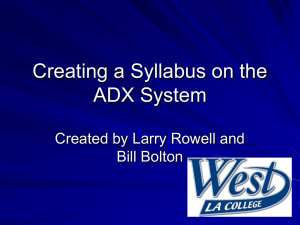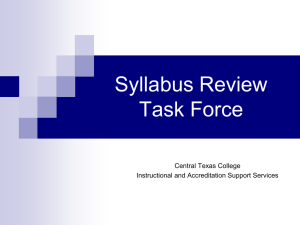An integrative syllabus for Second Language Acquisition
advertisement
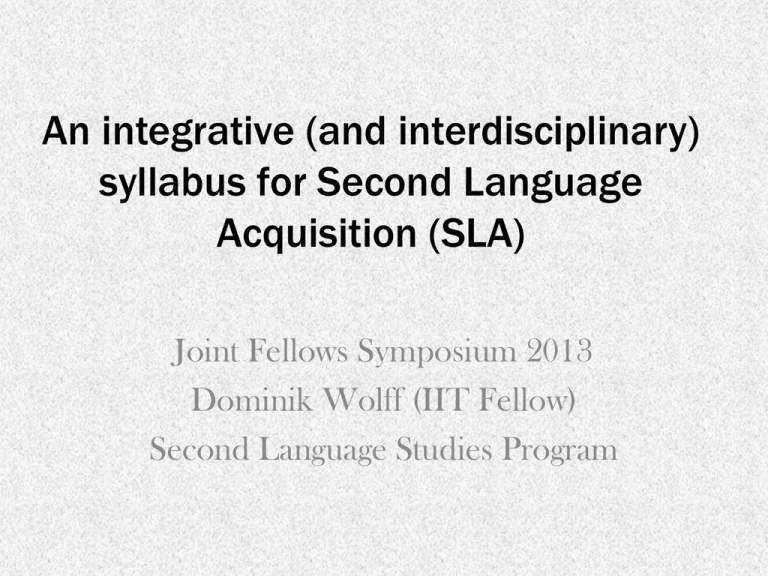
An integrative (and interdisciplinary) syllabus for Second Language Acquisition (SLA) Joint Fellows Symposium 2013 Dominik Wolff (IIT Fellow) Second Language Studies Program What is SLA? • Second language acquisition (SLA) is the study of how second languages are learned and the factors that influence the process. • Different approaches: e.g. cognitive, sociocultural • SLA is not inherently interdisciplinary although that is sometimes the claim (taking professors from different department does not make it interdisciplinary) The class • Undergraduate students; mostly Education majors (some language or TESOL minors); mostly juniors/seniors • Future teachers: content or languages (K-12), some teachers want to teach English abroad Syllabus: before and after Motivation for upgrading the syllabus: • Lack of value for the students (future teachers) • Although the topic is fundamentally ‘learning’, it makes SLA look abstract/unique/unrelatable Goal: • Integrate knowledge from disciplines and also from other sources, e.g. the students’ life experiences • Connect this knowledge with their future careers How do we get there? • Backwards design (Wiggins and McTighe, 2006) • Usually used for curricular units and not entire classes or programs (but it works for me) Syllabus (OLD) Materials: mostly SLA readings (articles) Articles: mostly from a cognitive perspective on SLA (most TAs’ and professors’ preferred area of research) Assignments: article presentations, quizzes, exams, (reflective) papers Syllabus (NEW) Syllabus: Additions/Changes Assignments: • Linguistic autobiography • Comparative case study / L2 learner biographies Syllabus: Additions/Changes Materials: • More variety • Articles yes, but not only of the academic kind • Multiple disciplines represented: e.g. psychology, educational psychology, teacher education • Selected readings from: – Atkinson, D. (Ed.). (2011). Alternative approaches to second language acquisition. London: Routledge. – Gibbs, R. (1994). The Poetics of Mind: Figurative Thought, Language, and Understanding. Cambridge: Cambridge University press. – Gladwell, M. (2008). Outliers. New York: Little, Brown & Company. – Kramsch, C. (Ed.). (2002). Language acquisition and language socialization: Ecological perspectives. London: Continuum. – Pinker, S. (2007). The Language Instinct: How The Mind Creates Language. New York: Harper Perennial Modern Classics. Previous Syllabus [Schedule] A work in progress – what’s next? • Get feedback from my current group of students about both versions of the syllabus • Try it out and refine it • Could be adapted for variety of contexts and classes (e.g. grad level; undergrad intro to linguistics) Special Thanks Ann Chrapkiewicz Colleen Tremonte Lami Fofana-Kamara Constance Hunt Michael Macaluso Linda Racioppi Samantha Noll Louise Jezierski Emily Riley Paula Winke Baburhan Uzum
